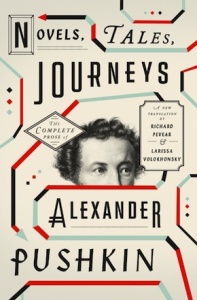Dalliances at the dacha
by Alexander PushkinOn rereading Pushkin’s fictional fragment ‘The guests were arriving at the dacha’ for about the seventh time in 1873, Leo Tolstoy found himself transported and inspired.
“Despite myself,” he noted, “not knowing where or what it would lead to, I imagined characters and events, which I developed, then naturally modified, and suddenly it all came together so well, so solidly, that it turned into a novel.”
This was the genesis of what would become his second masterwork, Anna Karenina. Here’s a short taster of the characters and setting that so moved him:
Among the young men of her surroundings Zinaida singled out Minsky. Evidently a certain similarity of character and circumstances of life was bound to bring them together. In his early youth Minsky’s wantonness of behavior had earned him the censure of society, which punished him with slander. Minsky had abandoned society, feigning indifference. For a time passions stifled in his heart the pangs of amour-propre; but, tamed by experience, he appeared again on the social scene and now brought to it, not the ardor of his imprudent youth, but the indulgence and seemliness of egoism. He did not like society, but he did not scorn it, for he knew the necessity of its approval. With all that, while respecting it in general, he did not spare it in its particulars, and was ready to offer up each of its members in sacrifice to his rancorous amour-propre. He liked Volskaya because she dared to openly despise the conventions he hated. He set her on with encouragements and advice, made himself her confidant, and soon became necessary to her.
B. occupied her imagination for some time.
“He’s too insignificant for you,” Minsky said to her. “All his intelligence is picked up from Les Liaisons dangereuses, just as all his military theory is stolen from Jomini.1 Get to know him intimately, and you’ll despise his ponderous immorality, just as military men despise his banal pronouncements.”
“I’d like to fall in love with R.,” Zinaida said to him.
“What nonsense!” he replied. “Why on earth would you have anything to do with a man who dyes his hair and rapturously repeats every five minutes: ‘Quand j’étais à Florence…’ They say his insufferable wife is in love with him; leave them alone: they’re made for each other.”
“And Baron W.?”
“He’s a little girl in uniform; what is there in him… but you know what? Fall in love with L. He’ll occupy your imagination: he’s as remarkably intelligent as he is remarkably ugly, et puis c’est un homme à grands sentiments; he’ll be jealous and passionate, he’ll torment you and make you laugh – what more do you want?”
However, Volskaya did not listen to him. Minsky divined her heart; his amour-propre was touched; not supposing that frivolity could be combined with strong passions, he foresaw a liaison without serious consequences, one more woman on the list of his flighty mistresses, and reflected cold-bloodedly on his victory. Most likely, if he could have imagined the storms awaiting him, he would have renounced his triumph, for a man of society easily sacrifices his pleasures and even his vanity to laziness and respectability.
Extracted from ‘The guests were arriving at the dacha’ in Novels, Tales, Journeys: The Complete Prose of Alexander Pushkin, a new translation by Richard Pevear and Larissa Volokhonsky, out now in hardback and eBook from Penguin Classics. Read more.
1 Antoine-Henri Jomini, a Swiss-born general and advisor to Alexander I and Nicholas I, whose writings on military theory were widely used in European and American military academies.


